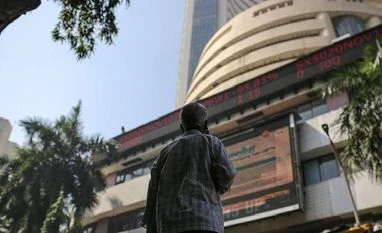The benchmark Sensex fell to its lowest level in seven months on Friday after declining for a fourth straight week. Sustained selling by foreign portfolio investors (FPIs) amid a sharp spike in global oil prices and growing tensions in Ukraine is weighing on performance despite strong buying support coming in from domestic investors.
Brent crude prices hovered close to $115 per barrel as Russia’s onslaught on Ukraine showed little signs of easing.
The benchmark Sensex fell 769 points, or 1.4 per cent, to end the week at 54,334, lowest close since August 6, 2021. The Nifty ended the session at 16,245, with a decline of 252 points or 1.5 per cent. The Sensex declined 2.7 per cent for the week.
The biggest worry for the Indian markets has been the skyrocketing of oil prices and sharp selling by overseas funds.
“Supply constrained oil price rises are bad for India. Indeed, the recent 25 per cent jump in oil prices will expand the current account deficit by 75 basis points (bps) and inflation by 100 bps on an annualised basis. Historically, India's relative stock prices to emerging markets (EMs) have reacted poorly to oil price increases caused by supply outages,” said a note by Morgan Stanley led by equity strategist Ridham Desai.
The report, however, highlighted several factors that could help India withstand the oil shock better. These include declining oil consumption relative to GDP, strong policy environment and rising domestic flows.
On Friday, FPIs sold shares worth Rs 7,631 crore, while domestic institutional investors bought shares worth Rs 4,739 crore. In February FPIs sold equity worth Rs 45,720 crores through the stock exchanges–most since March 2020. So far this month, they have dumped stocks worth more than Rs 15,000 crore.
Investors across the globe are assessing the economic costs of this prolonged war. Equity markets globally have turned more volatile after Russian forces captured the site of Europe's largest nuclear power plant, the Zaporizhzhia plant in Ukraine. The Russian shelling caused a fire at a training complex in the Zaporizhzhia plant, which was later extinguished.
The war has added to the concerns of slowing economic growth and inflation, rattling investors for some months now.
"The Russia-Ukraine conflict, fresh sanctions on Russia by global powers, and reports of the Russian attack on Europe's biggest nuclear plant in Ukraine added more tension on global investors. Rising oil prices along with uncertainties of supply chain disruption have instilled fears of inflation crossing RBI's tolerance level," said Vinod Nair, head of research, Geojit Financial Services.
Analysts said markets are now at the mercy of the headlines from Ukraine and are pricing the worst-case scenario. Russia's invasion of Ukraine has soared the prices of foodstuff, metals and oil. And are adding to the already elevated inflationary pressures and fuelled worries of an economic slowdown.
"From India's viewpoint, a sharp spike in crude oil prices (Brent above USD100/barrel) poses key risks on the external balance front and can play spoilsport with the assumptions made in the FY23 Union Budget. It is difficult to predict the end of the Ukraine conflict. If sustained for an elevated duration, higher crude oil prices can result in higher inflation, current account deficit, bond yields, and interest rates in India and thus impact macro-economic stability,' said Siddhartha Khemka, head of retail research, Motilal Oswal Securities.
Going forward, in addition to geopolitical tensions, the domestic market will look at state election exit poll data and policy statements by central banks, especially the US Federal Reserve.
"State elections outcome is unlikely to be a crucial factor rather than a short-term positive & negative reaction, accordingly. Due to war uncertainties, central banks may balance their hawkish policy. It can provide leeway to the market in the short term," said Nair.
The market breadth was weak, with 2,201 stocks declining on BSE against 1,160 advances. More than two-thirds of Sensex stocks declined. Reliance Industries declined 2.2 per cent and was the biggest drag on Sensex. All the sectoral indices on BSE declined. Auto stocks fell the most, and its sectoral index declined 3.4 per cent.
Unlock 30+ premium stories daily hand-picked by our editors, across devices on browser and app.
Pick your 5 favourite companies, get a daily email with all news updates on them.
Full access to our intuitive epaper - clip, save, share articles from any device; newspaper archives from 2006.
Preferential invites to Business Standard events.
Curated newsletters on markets, personal finance, policy & politics, start-ups, technology, and more.
)